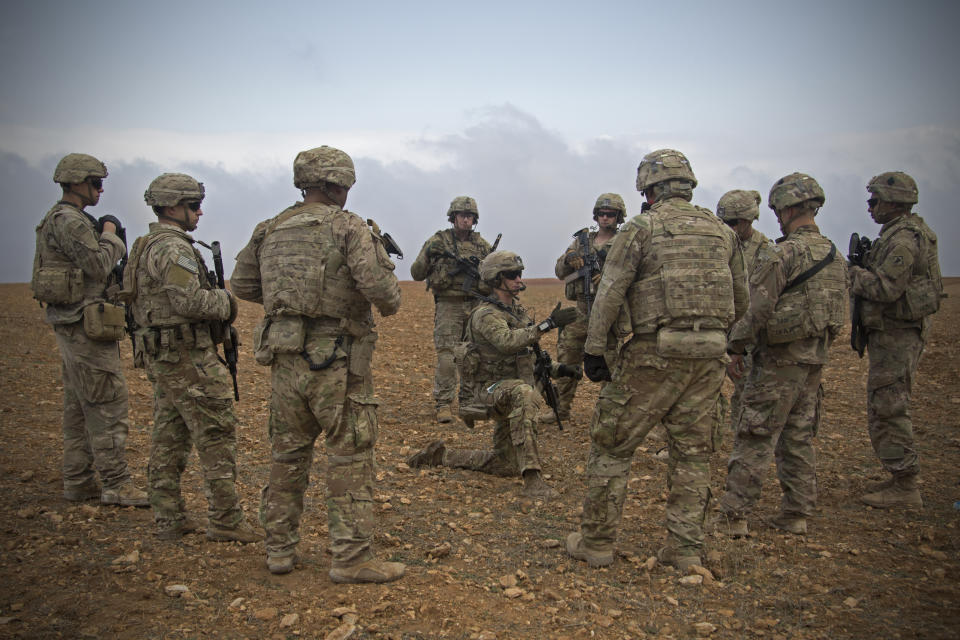2 opposing views of Syria and Mattis, from Bob Corker and Rand Paul
Two prominent Republican senators are presenting two diametrically opposed perspectives on President Trump’s decision to pull U.S. troops out of Syria.
Sen. Bob Corker of Tennessee and Sen. Rand Paul of Kentucky appeared back to back on CNN’s “State of the Union With Jake Tapper” on Sunday morning. Corker accused Trump of making a hasty decision that would endanger our allies, but Paul contended that U.S. military intervention overseas often foments terrorism and backfires.
![Sen. Bob Corker, President Trump and Sen. Rand Paul. (Photo illustration: Yahoo News; photos: AP [2], Zach Gibson/Bloomberg via Getty Images)](https://s.yimg.com/ny/api/res/1.2/93nwD6nvZOKbC25TbG0NdQ--/YXBwaWQ9aGlnaGxhbmRlcjt3PTk2MDtoPTUxNw--/https://media.zenfs.com/en/homerun/feed_manager_auto_publish_494/66e047277734a75280e74a70cf67a227)
Corker, who has distanced himself from Trump over the past year and is retiring from the Senate, said the U.S. military has been working with 60 coalition groups, including the Kurdish and Arab members of the Syrian Democratic Forces, in the fight against ISIS and other terrorists in Syria. He said ISIS is now mostly confined to the Euphrates River valley and that the United States and its allies are only a few months away from “finishing something that we started” and “annihilat[ing] a large number of ISIS members.”
“I’m just saddened for our country. I’m saddened for the broken relationships with countries that have been with us. I’m saddened for the many Kurds and others who will likely be killed and slaughtered by either the Syrians or the Turks. I’m saddened for our country in being so unreliable,” Corker said.
Corker, chairman of the Senate’s Committee on Foreign Relations, said he was “devastated by” James Mattis’s decision to resign as defense secretary Thursday, a development he said was “very important for our country.” In his resignation letter, which was precipitated by Trump’s sudden announcement of the pullout from Syria and a 50 percent reduction in U.S. troops in Afghanistan, Mattis made it clear that he disagrees with how the president is handling America’s relationships with allies and adversaries.
“For some of these machinations we see coming out of 1600 Pennsylvania [Avenue], people realize they don’t really matter,” Corker said. “This one matters. It matters to our country, our foreign interests. This matters to our citizens.”

Corker acknowledged that armed forces have been in Afghanistan for a long time and understands the frustration with continued U.S. presence there. But he said Syria is different and that the relatively small cost of keeping around 2,000 troops there justifies the effort to destroy ISIS and keep a check on Russia and Iran.
“I have no understanding of why we did what we did in Syria. It totally boggles any sane thinking that could take place,” he said. “I don’t understand it.”
Paul, the next guest on “State of the Union,” offered a different view of Trump’s decision. As he did in his 2016 presidential campaign, and has done in the Senate for years, Paul argued for avoiding unnecessary foreign entanglements and ending the seemingly perpetual military deployments overseas.
“I’m very proud of the president. This is exactly what he promised, and I think the people agree with him,” Paul said. “People believe that we’ve been at war too long and in too many places and that we do need to turn attention to problems we have at home here: roads, bridges, schools. We have a lot of problems in our country.”
Tapper asked Paul if he is at all concerned that the Turkish defense minister has publicly threatened to attack America’s Kurdish allies as soon as the United States withdraws.
“Even Gen. Mattis has sort of admitted that there’s no military solution to Syria and that there’s no military solution to Afghanistan. So, I think really it’s the opposite. I think the burden should be on Gen. Mattis and those who want to stay forever in every war theater around the world,” Paul said.
Military officials have said a “precipitous” withdrawal of U.S. troops could result in a military catastrophe and that allies would think twice before joining us for future emergencies.
“The president said when we went into Syria very clearly, ‘We’re going to defeat ISIS.’ That was our goal. Then all these people who believe in forever war changed the goal. They changed the goalposts. They changed the mission, and they started saying, ‘Oh, we’re going to stay there until Iran and Russia leave. That means we’re staying forever, you know?”

Paul said Iran is not leaving unless the United States wants to start another war with Iran and that everyone involved needs to find a peaceful solution, which he acknowledged would be difficult. Nevertheless, he said that leaving U.S. troops in Syria is a “trip wire” to an even larger, expansive war.
He said that having Americans policing Muslim lands engenders more terrorism and that the United States should not be involved in nation-building.
“We’re not going to create a nation out of that chaos of Syria or Afghanistan. We’re going to take care of things we’ve got here at home,” Paul said. “And I think the people are with him. Washington’s against [the president], but this wouldn’t be the first time that Washington doesn’t represent the people very well.”
_____
Read more from Yahoo News:


